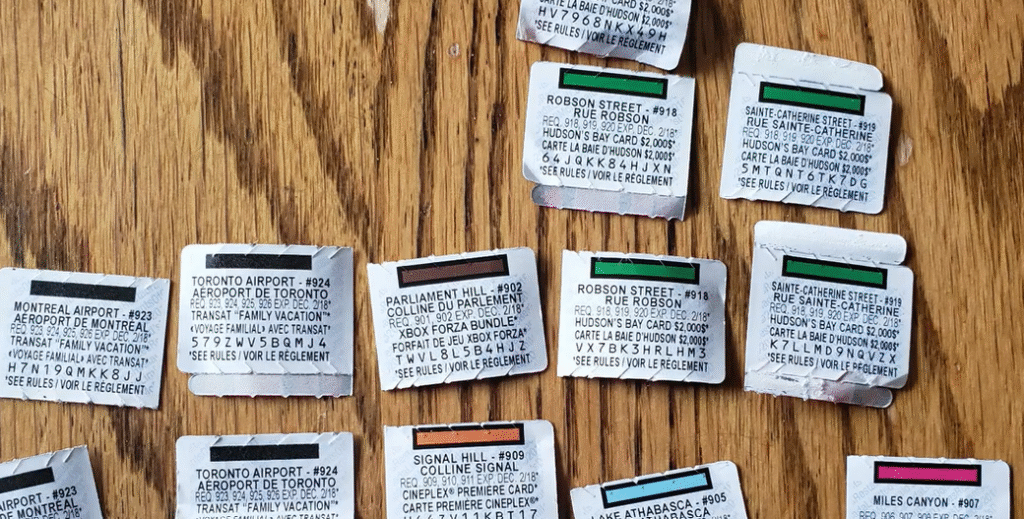The basic yet incredibly successful concept behind McDonald’s Monopoly is to purchase specific items, remove the stickers, and find either instant wins or collectible property pieces. Consumers enjoy the unexpectedly low cost of winning a cheeseburger or fries, but players are drawn back by the promise of a big prize and the elusive property sets, such as Mayfair in the UK or Boardwalk in the US.
With digital integration, the system has significantly improved in recent years. Players can bank property codes, access online-only draws, and even earn bonus entries by responding to quick skill questions through the McDonald’s app. In addition to making participation much more flexible, this digital shift expedites the process and appeals to younger audiences who are used to gamified apps while also satisfying older customers who recall a time when the campaign only used physical boards.
Because rare property pieces are scarce, the campaign bears a striking resemblance to lotteries. Only a small number of people possess the final component needed to complete a million-dollar set, while thousands collect the same common stickers. Online rumors are stoked by this deliberate rarity, leading to Reddit discussions and TikTok videos in which gamers discuss duplicates, annoyances, and brief victories. Scarcity becomes part of the appeal, much like with sneaker raffles or limited-edition merchandise drops.
Table: Key Profile – McDonald’s Monopoly Promotion
| Category | Details |
|---|---|
| First Launch | 1987, United States |
| Concept Creator | Partnership between McDonald’s and Hasbro (Monopoly rights holder) |
| Type | Sales promotion disguised as a collectible prize game |
| Format | Game pieces on qualifying menu items; prizes include food, cash, cars, vacations |
| Game Mechanics | Instant win stickers, property sets, online/app-based codes |
| Major Prizes | Cash up to $1,000,000, luxury cars, vacations, electronics |
| Common Prizes | Free fries, cheeseburgers, drinks, desserts |
| Controversies | 2001 fraud scandal involving employees rigging major prizes |
| Cultural Impact | Annual pop culture event, compared to sweepstakes like Publisher’s Clearing House |
| Reference | https://en.wikipedia.org/wiki/McDonald%27s_Monopoly |

On occasion, celebrities have joined in the fun by sharing amusing photos of their stickers or making jokes about coming close to owning their ideal vehicle. McDonald’s Monopoly becomes more cultural than commercial as a result of this interaction between regular consumers and well-known individuals. The promotion gains a halo of shared experience when athletes or pop stars casually mention playing, evoking remarkably similar enthusiasm from both professionals and teenagers.
The campaign’s mainstay is still instant wins. Their appeal is very obvious: peel a sticker to get a free McFlurry or apple pie right away. Non-food rewards, which are frequently connected to outside partners, broaden the brand’s audience by connecting consumers with far-reaching sectors, such as electronics merchants, streaming services, or travel agencies. By utilizing these alliances, McDonald’s enhances customer loyalty and positions itself with benefits beyond fast food.
Another layer is added by the “no purchase necessary” rule. In order to prevent the campaign from falling under gambling classifications, customers can request free stickers via mail. This clause, which is rarely used, is very effective at maintaining legal credibility because it provides a technical safeguard that keeps the promotion legitimate even when the majority of customers keep purchasing fries and shakes in order to accrue stickers.
The franchise has had difficulties, most notably the 2001 scandal in which insiders stole rare pieces, depriving customers of their chance to win significant prizes. The dispute, which was later portrayed in documentaries, demonstrated how trust can be eroded when reward and chance collide. Since then, McDonald’s has tightened controls and combined digital monitoring and auditing systems, making the process incredibly dependable and reviving confidence in the campaign’s fairness.
The Monopoly promotion, which combines behavioral economics and nostalgia, is frequently praised by marketing experts as being especially inventive. The campaign cleverly increases average spending by encouraging customers to upgrade their meals because larger items come with more stickers. Fast food can mimic the dynamics of major shopping events, as evidenced by the comparison of holiday retail spikes to revenue surges during Monopoly seasons.
The impact on society is significant. Office workers pool stickers in group bids for large prizes, families gather pieces together, and friends trade duplicates. These instances effectively convert consumption into connection by transforming a routine burger purchase into a social ritual. McDonald’s Monopoly thrives on shared anticipation and group chatter, much like March Madness brackets or fantasy football leagues.
The game’s flirtation with gambling psychology, which encourages repeat purchases under the enticement of rare wins, is noted by critics. However, a lot of players find it to be surprisingly inexpensive entertainment, and even the smallest prize, like free fries, feels like a win. The promotion’s cultural relevance is maintained by striking a balance between controversy and joy, echoing larger discussions about video game loot boxes, casino apps, and lottery scratch-offs.

